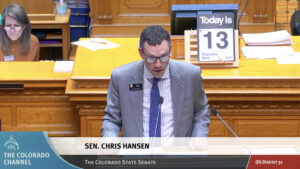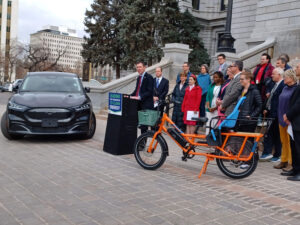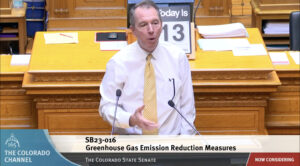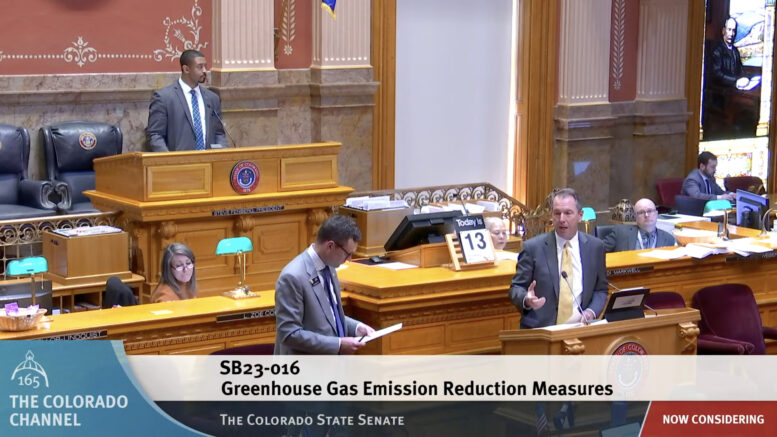An “ambitious” climate bill that would speed up Colorado’s decarbonization efforts, incentivize the purchase of electric lawn equipment and streamline the regulation of carbon-sequestration wells passed the state Senate on a Democratic-led party-line vote Friday.
Senate Bill 16, sponsored by Democratic Sen. Chris Hansen of Denver, is one of several bills trying to reduce greenhouse gas emissions that is moving through the Legislature this year, but it stands out for the breadth of sectors and activities that it could affect. An amendment made Thursday to the bill, for example, would fine utilities as much as $20,000 per day for failing to connect residential customers’ solar arrays and electric-vehicle chargers to the electric grid in a timely manner, and the bill also requires the state’s public-pension fund to report on its climate-related investment risks.
SB 16 is similar to a measure that died late in the 2022 session, though less prescriptive when it comes to both lawn equipment and the climate-related portfolio of the Public Employees’ Retirement Association. But it continues to frustrate utilities and other businesses by moving the goalposts once again to speed up reduction of greenhouse gas emissions at a time when companies are dealing consistently with new rules or proposals in this area.
“The worst effects of climate change”
Hansen said that while former goals and the provisions that were put into law to help reach those goals may have been adequate at the time, increasing levels of climate change now requires the state to act with greater urgency.

Colorado state Sen. Chris Hansen speaks Thursday about his Senate Bill 16.
“Folks, this bill is fundamentally about the next generation and the one after and the one after that. Will we have a planet that is habitable? Will we have a Colorado that we can enjoy skiing, that we can enjoy our mountains without the constant threat of natural disasters?” Hansen asked senators during floor debate on Thursday. “The headline of this bill is that we get to net zero by 2050. There is no backpedaling from that if we hope to avoid the worst effects of climate change on our great state.”
Currently, Colorado law includes goals to reduce statewide greenhouse gas emissions 26% by 2025 as compared to 2005 levels, 50% by 2030 and 90% by 2050. SB 16 would up the 2050 goal to 100% and add new interim goals — 65% by 2035, 75% by 2040 and 90% by 2045.
While this climate bill and other laws don’t specify how the state must reach those goals, they give the state some wide leverage to implement policies to do so. Those policies so far have included regulations on the energy and transportation sectors to reduce emissions are likely will expand to more sectors of the economy, such as construction, in the future.
Moving goalposts
Keith Hay, senior director of policy for the Colorado Energy Office, asked the Senate Transportation and Energy Committee at a Jan. 25 hearing to amend the new goals out of the bill so that his office could do an analysis on them before they were set into law, especially as the state’s had challenges reducing emissions from the transportation sector. However, Hansen announced during a March 8 news conference with Gov. Jared Polis to roll out a package of green-energy incentives that a compromise on the bill gave it a “clear path” to the Democratic governor’s desk — a change lowering the 2040 goal from 80% reduction to 75%.

Colorado state Sen. Chris Hansen speaks at a March news conference on the west steps of the Capitol about his efforts at decarbonization.
That has done little to salve utility leaders and business groups that have noted that the latest movement in the emissions-reduction goals comes even as the state remains in rulemaking regarding current Greenhouse Gas Pollution Reduction Roadmap targets. Jeff Lyng, Xcel Energy area vice president of energy and sustainability policy, told the committee that the technology needed to hit the new goals won’t be available for 10 to 15 years, and Colorado Chamber of Commerce Senior Vice President of Governmental Affairs Meghan Dollar said businesses need time to achieve current goals.
“We’re moving the goalposts,” Colorado Competitive Council Executive Director Rachel Beck told the committee. “We must show the transition plans work before doubling down.”
Fines for utilities
Utility companies likely won’t be happy either with a provision Hansen added Thursday to SB 16 that could fine them $20,000 per day if retail distributed generation resources like solar panels and electric-vehicle chargers are not connected to their system within 60 days of payment from customers. Hansen first proposed the fee, which is a response to a now-cleared backlog of connections that some utilities faced this winter under high demand and labor shortages, to be as high as $200,000 a day for EV chargers and $150,000 a day for solar displays before negotiating it down, utility leaders have said.
Existing law allows for fines as high as $2,000 a day for utility delays of more than 60 days.
SB 16 also offers 30% income-tax credits between 2024 and 2026 for sellers of new electric lawn equipment such as lawnmowers, weed whackers and leaf blowers as an incentive to get people to purchase equipment with lower greenhouse gas emissions. Hansen proposed a future ban on the sale of some new gas-powered lawn equipment in his failed 2022 bill but offered a carrot rather than a stick this year after receiving backlash.
Other provisions in climate bill
The bill also requires PERA to include in its annual investment stewardship report a description of climate-related investment risks and strategies. It originally sought to require the pension fund to ensure its voting decisions on areas like investments align with the greenhouse gas emissions reduction goals, but Democratic Sens. Kyle Mullica and Chris Kolker joined with Republicans on the Senate Finance committee to remove that section.
“I support all of these environmental goals. The technical issue that I have here is acting as a fiduciary,” Kolker, of Centennial, said in the committee’s Feb. 21 meeting. “The precedent-setting, telling them how to use their authority on specific issues … I just don’t personally see this as a legislative authority.”
SB 16 also allows the Colorado Oil and Gas Conservation Commission to ask the federal government for authority to issue and enforce permits for Class VI injection wells that are used for sequestration of greenhouse gases. It’s part of a larger effort by the COGCC to encourage and boost carbon sequestration that also includes efforts to make it easier for companies to set up carbon-capture plants to take harmful gases from the air and sequester them.
Republican pushback

Colorado Senate Minority Leader Paul Lundeen speaks Thursday on the floor of his chamber against Senate Bill 16.
Senate Minority Leader Paul Lundeen called the bill “incredibly ambitious” and argued that several changes made by Hansen — including reduction in the 2040 greenhouse-gas-emissions reduction goal — raise the question of whether the state is moving too fast in these areas. He and other Republicans said they oppose the bill because it is trying to insert government into too many areas — from carbon sequestration to lawn-equipment purchases – at one time without understanding whether the new goals are requirements are feasible.
“It begs the broader question: Are we on a track that’s sustainable?” Lundeen asked. “Is ‘Zero Emissions by 2050’ reasonable or not?”
SB 16 heads next to the House for its consideration.
